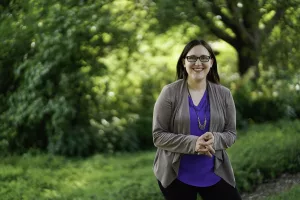
State Rep. Jamie Becker-Finn ’11
Jamie Becker-Finn ’11 grew up on the Leech Lake reservation, an impoverished community in northern Minnesota where she has seen first-hand what poverty, discrimination, and an inequitable justice system can do to families and children.
And when those families can’t afford legal representation to argue on their behalf, things get even more complicated. In some cases, parents lose parental rights of their children permanently.
For Becker-Finn, a Minnesota state representative, it was a no-brainer to look for ways the legislature could work to give those parents a fair chance. And she found a partner in that work in the Institute to Transform Child Protection at Mitchell Hamline.
Becker-Finn, who also chairs the Judiciary Finance and Civil Law committee in the Minnesota House, sponsored legislation this spring that expands legal representation for parents of children going through child welfare cases. Two years ago, lawmakers mandated attorneys be appointed in child welfare cases for parents who can’t afford them. This year, they extended that mandate to cases that are appealed. The Institute to Transform Child Protection worked on both bills.

Prof. Joanna Woolman
Joanna Woolman, the institute’s director, said this year’s extension was especially necessary because there’s a dearth of attorneys in Minnesota who have the needed experience to try child welfare cases at the appellate level. Given that, the new law also creates a state agency that will provide training and create a repository of lawyers who are experts in child welfare cases, especially appellate cases.
“The biggest issue in these cases and the reason why you really need to be vigilant, you only have 20 days (to appeal),” said Woolman. “And then those appeals are the highest stakes cases, the most complicated, and the ones with the fewest experts available.”
Students Hannah Burton and Brooke Beskau Warg also had the opportunity to work on efforts to pass the bill. Both have since graduated and joined the institute full-time as an Equal Justice Works fellow.
Data show parents are more likely to keep custody of their children if they have legal representation in what are often complex, emotional, and fast-moving cases: A parent struggling with mental health and addiction could lose custody of their children, even if they plan to seek treatment. A parent experiencing domestic violence could also lose their child even when circumstances are out of their control. Without a lawyer who walks parents through the process and advocates for them, it can be difficult to achieve a fair outcome.

Minnesota Capitol Building
Even with the law guaranteeing attorneys in child welfare cases, Woolman says it’s still been difficult to implement because of lack of funding, expertise, and overall systemic inequities. She said the bill (and its extension) have been a decade in the making. Legislators have finally realized how far behind Minnesota was compared to other states, which then led to bipartisan support to expand the law and provide additional funding. Additionally, having the right to parent a child is a core issue that many people can relate to.
“Intervening with someone’s right to parent is so compelling to so many people, it’s a shockingly familiar right,” said Woolman. “Many people can empathize with how terrifying it would be to face the prospect of losing your child without a lawyer by your side.”
Becker-Finn, who is also an adjunct professor at Mitchell Hamline, added she came to the effort having personal experience of seeing people in her life lose parental rights. “Long-term, is that really the best thing for the kid when the parent is stable and okay? It’s a very serious issue that a lot of my work has been about: making sure justice system outcomes are not determined by how much money you have.
“We want to make sure that every kid has access to their parent in the same way or the same level regardless of whether that parent is a sophisticated legal system user.”
This story was written by Riham Feshir, a freelance writer in the Twin Cities.
